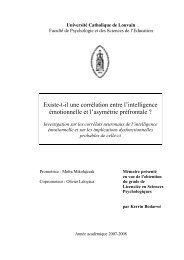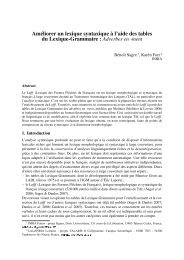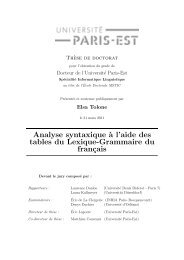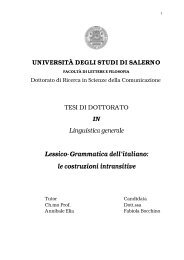Dream a little dream of me: Cognate Predicates in English
Dream a little dream of me: Cognate Predicates in English
Dream a little dream of me: Cognate Predicates in English
You also want an ePaper? Increase the reach of your titles
YUMPU automatically turns print PDFs into web optimized ePapers that Google loves.
DREAM A LITTLE DREAM OF ME: COGNATE PREDICATES IN ENGLISH<br />
as unergative one-place predicates, <strong>in</strong>s<strong>of</strong>ar as they appear to assign to Dog and Alice the<br />
grammatical relation SUBJECT OF and the thematic role COUGHER and LAUGHER respectively. In the<br />
suggested analysis, however, it is impossible to ascerta<strong>in</strong> the [±Legitimiser] role <strong>of</strong> the verb<br />
that comb<strong>in</strong>es with a CO. A positive value <strong>of</strong> the feature <strong>in</strong> (9c) would have no semantic<br />
effect at all <strong>in</strong> that the verb to laugh would assign Alice the sa<strong>me</strong> syntactic and thematic roles<br />
also assigned by the noun predicate laugh.<br />
The three types <strong>of</strong> support verb constructions can be regarded as the comb<strong>in</strong>ation <strong>of</strong> two<br />
features:<br />
SUPPORT VERBS<br />
[+Lexical] [–Lexical]<br />
[+Legitimiser] [–Legitimiser] [–Legitimiser]<br />
4. Measure phrase constructions<br />
Table 1: Three types <strong>of</strong> support verbs<br />
MPs are the subject <strong>of</strong> a vast number <strong>of</strong> studies. So<strong>me</strong> <strong>of</strong> these conta<strong>in</strong> analyses <strong>of</strong> <strong>me</strong>asure<br />
items that occur <strong>in</strong>side an adjectival phrase, e.g. I need a ten foot long cord (see Flick<strong>in</strong>ger<br />
and Bond 2003). This study disregards such uses to concentrate ma<strong>in</strong>ly on phrases such as 27<br />
kilos <strong>in</strong> (2) above. No reference will be made to the nu<strong>me</strong>rous tests apt to illustrate the nonargu<strong>me</strong>ntal<br />
nature <strong>of</strong> MPs (see those conta<strong>in</strong>ed <strong>in</strong> Riegel 1999 and Safa 2004, e.g. tests with<br />
paraphrases). Uncerta<strong>in</strong>ties regard<strong>in</strong>g their (non-)argu<strong>me</strong>ntal nature all spr<strong>in</strong>g from the fact<br />
that <strong>in</strong> the weigh-kilo type the PVN is obligatory.<br />
Sentences such as (2) are <strong>in</strong>terpreted as multi-predicative structures with a type <strong>of</strong><br />
hyperonym-hyponym pair <strong>of</strong> lexical items. A central aspect <strong>of</strong> the head <strong>of</strong> a MP is the<br />
relationship between these items. As Riegel 1999 po<strong>in</strong>ts out, <strong>in</strong> Jean weighs 60 kilos the ’60<br />
kilos’ are necessarily Jean’s rather than so<strong>me</strong>one else’s (Jeani weighs 60 kilosi). With<strong>in</strong> an<br />
analysis that treats 60 kilos as a comple<strong>me</strong>nt, the relationship between Jean and kilos, shown<br />
above by <strong>me</strong>ans <strong>of</strong> <strong>in</strong>dex shar<strong>in</strong>g, turns out to be ad hoc and arbitrary. On the other hand, a<br />
view <strong>in</strong> which 60 kilos is predicative yields a necessary relationship between such a predicate<br />
and its argu<strong>me</strong>nt. The noun 60 kilos and the verb weigh are analysed as cognate predicates<br />
shar<strong>in</strong>g the sa<strong>me</strong> argu<strong>me</strong>nt (Jean). The predicative relationship between the MP and the<br />
subject guarantees that the 60 kilos are Jean’s, whereas the verbal predicate guarantees that it<br />
is Jean who has a certa<strong>in</strong> weight.<br />
In a dist<strong>in</strong>ct MP construction, e.g. He ran a race, the verb and the PVN are also cognate<br />
lexical items <strong>in</strong>terpretable as hyperonym and hyponym respectively. This clause-type differs<br />
from the weigh-type <strong>in</strong> several ways. For example, the MP is optional and has certa<strong>in</strong> <strong>of</strong> the<br />
properties <strong>of</strong> direct objects. Predicative nouns <strong>of</strong> support verb constructions that do not<br />
<strong>in</strong>volve MPs can be optional and bear a (surface) direct object grammatical relation, as <strong>in</strong> the<br />
CO construction, or be mandatory with no direct object properties (regardless <strong>of</strong> word order),<br />
as with catch sight <strong>of</strong>, heave/cast/weigh/drop anchor (which appear to be collocations). Thus<br />
run a race would align with the for<strong>me</strong>r support verb construction, whilst She weighs 60 kilos,<br />
<strong>in</strong> which the MP rema<strong>in</strong>s a predicate throughout the structure, would align with the latter.<br />
5. Conclud<strong>in</strong>g remarks<br />
Analyses <strong>of</strong> pairs <strong>of</strong> sentences such as Mark Twa<strong>in</strong> died grueso<strong>me</strong>ly ↔ Mark Twa<strong>in</strong> died a<br />
grueso<strong>me</strong> death (from Nakajima 2006: 679) that ignore possible support uses <strong>of</strong> verbs give<br />
26 th conference on Lexis and Grammar, Bonifacio, 2-6 October 2007







